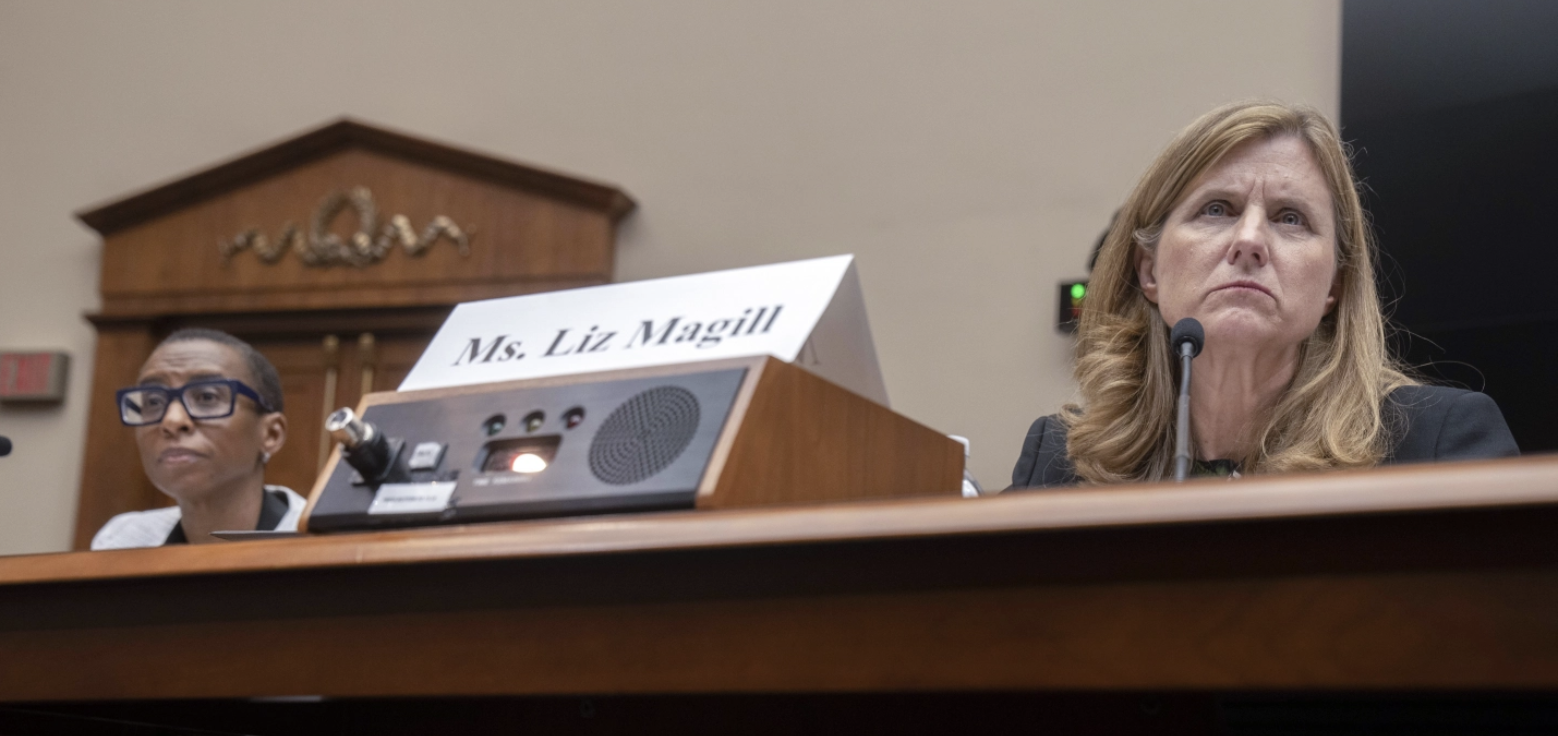It may be no coincidence that colleges are abandoning SATs at the same time three university presidents were flunking questions in public about genocide. After receiving Fs for insisting that the answer to any direct question is “It depends on the context,” University of Pennsylvania President Liz Magill lost her job and Harvard’s board of governors retained Claudine Gay with a limp vote of confidence—“she is the right leader to help our community heal.” Uh-huh.
Question: What six-syllable word describes the three university presidents who testified before Congress?
Answer: Pusillanimity.
Next: Name as many synonyms as you can for “pusillanimity.”
Answer, by way of the Merriam-Webster dictionary (remember those?): Cowardice, cravenness, gutlessness, spinelessness and—my favorite—poltroonery.
In those plain words is written the history of academia’s plummet the past 50 years from respectability to antisemitic riots.
First came the speech codes. No, those came second. What began the long downhill roll in the 1970s was grade inflation. Students whose work deserved a C demanded an A or B. Professors who resisted this threat to standards gave up.
That was an early inkling that traditional college norms could be pushed around and politicized. Speech codes emerged at many schools, not least Harvard, arguing that certain words were—another new vocabulary addition—“hurtful.”
After establishing that words alone could bring reprimand by the university, the speech coders expanded the prohibitions to include something new called microaggressions, or inadvertent slights. Microaggressions had a fraternal twin, trigger warnings, which required profs to warn students that a text or even a thought might distress them.
It sounds like a joke now, but we know it was no joke. This was the moment when the adults in the room—presumably the universities’ presidents—should have intervened to protect free speech and inquiry from being diminished. They did not. Virtually without exception, they were pusillanimous. Fellow ostriches included hundreds of spineless boards of trustees.
Here we bring back to this space an important figure in the universities’ decline: Herbert Marcuse (1896-1979). Though Marcuse isn’t a household name, any purportedly serious university intellectual—say, Ms. Magill of Penn or Harvard’s Ms. Gay—knows about his contribution to governance at their institutions.
Marcuse, a left-wing philosopher who taught at Columbia and Harvard, proposed zero tolerance for conservative ideas. “Liberating tolerance,” Marcuse wrote in 1965, “would mean intolerance against movements from the Right and toleration of movements from the Left.” No one needs a doctorate in anything to understand that. He wasn’t done: “Certain things cannot be said, certain ideas cannot be expressed, certain policies cannot be proposed.”
I can’t conceive a more concise description of cancel culture, which we got.
University presidents should have recognized—or acknowledged—that cancel culture was another sign their schools were off the rails. In fact, Marcusian cancellation had begun years earlier, when liberals shunned their conservative colleagues for jobs or tenure, largely eliminating them from American campuses. But then they came for the liberals.
With few conservatives available to attack, student activists went after liberal and left-wing professors who somehow offended their limitless sensibilities. This expansion of activist intolerance had other pernicious effects. In 2015 after weeks of being vilified by students over one of these incidents at Yale, lecturer Erika Christakis described a grim social phenomenon: “Numerous professors, including those at Yale’s top-rated law school, contacted us personally to say that it was too risky to speak their minds.”
So they pulled down the shades, turned away and let a student mob at Yale go after a colleague. Such behavior became the norm.
How can anyone have been shocked at the antisemitic marches at universities across the country the past two months? What happened was the ugly culmination of decades of institutionalized cowardice. For those three university presidents testifying before Congress about “context” in the calm tones of a graduate seminar, the anti-Jewish protests were simply another occasion to look the other way.
For now, the scales seem to have fallen from many eyes, but will anything really change once past the schools’ antisemitism crisis? Penn’s obtuseness goes back years. The resignation of its president came only after the murder of 1,200 Israelis and an alumnus’s threat to withdraw a $100 million donation. That’s a big final straw.
An opportunity is at hand to reorient U.S. colleges away from terminal loopiness and back to learning. This is a battle that will have to be fought and refought. Some suggest wider adoption of the Chicago Principles on speech, but Columbia and Princeton did that years ago, to minimal effect.
Harvard’s President Gay this week said “those who threaten our Jewish students will be held to account,” which could mean next to nothing. When, come next year, some student or professor steps forward to speak against the manifest excesses of diversity, equity and inclusion, how many nameplate donors, credential-seeking students and parents or tenured faculty will defend him?
After its awful antisemitic plunge, the much-invoked “university community” could do worse than adopt one policy: Don’t hide. Don’t cower. Stop being craven. It’s a tough job, but someone has to do it.
To see this article and to subscribe to other articles like it, please choose to read more.
 Listen Online
Listen Online Watch Online
Watch Online Find a Station in Your Area
Find a Station in Your Area









 Listen Now
Listen Now Watch Online
Watch Online
